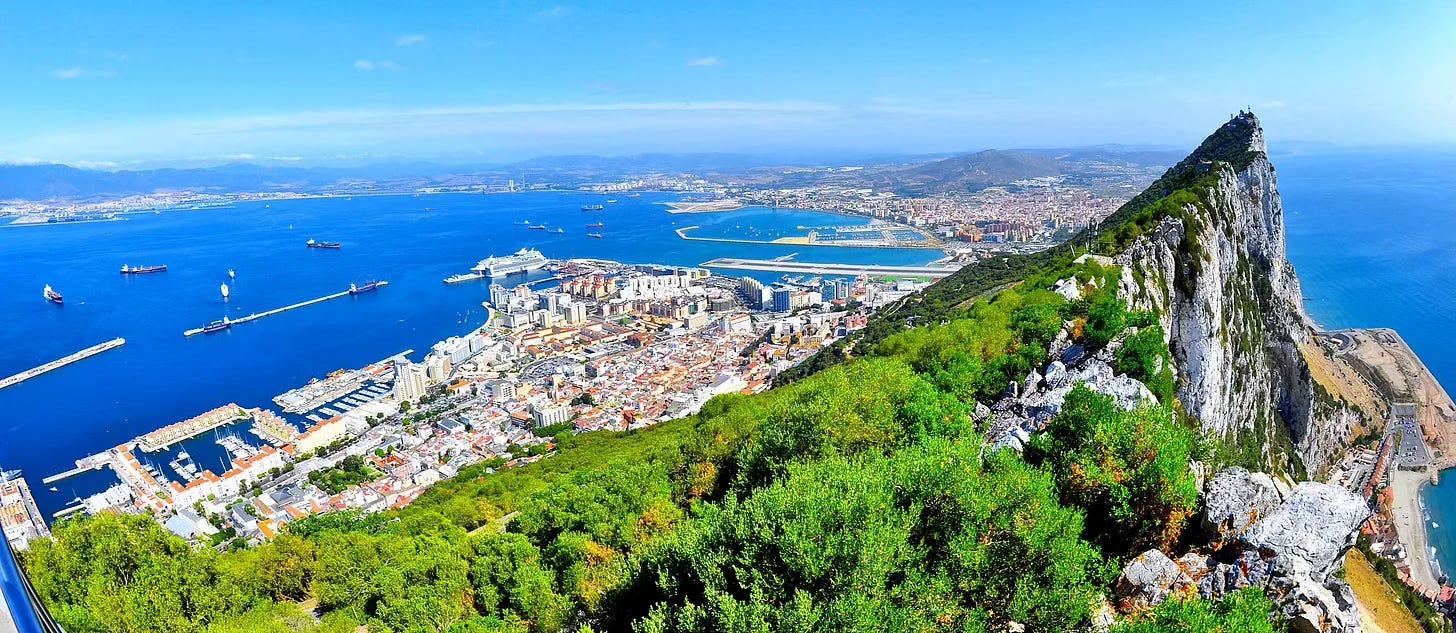London-based barristers taking part in a public inquiry into allegations of corruption in Gibraltar tell me they are “extremely concerned” by emergency legislation that they believe could prevent the inquiry operating effectively.
As I explained last year, the inquiry was set up by the governor of Gibraltar at the request of the chief minister. Under Gibraltar’s Commissions of Inquiry Act 1888, Sir Peter Openshaw, a former judge of the High Court of England and Wales, was appointed as its chair in February 2022.
His terms of reference require him to inquire into the reasons and circumstances leading to the early retirement of Ian McGrail as the island’s police commissioner in June 2020.
McGrail claims he was forced out of office because he had executed a search warrant against a friend of the chief minister, Fabian Picardo KC. That’s denied by the Gibraltar government.
Gibraltar and the Spanish coast
The inquiry has been delayed by a series of increasingly surreal developments, some of which I outlined last year. After a series of preliminary hearings, the substantive inquiry is now scheduled to open on 8 April.
In an unexpected move last Thursday, the Gibraltar government proposed new legislation that would replace the Commissions of Inquiry Act. The government said in an explanatory memorandum that its bill would replicate the UK’s Inquiries Act 2005, bringing Gibraltar law into line with statutory inquiry law in the UK.
Normally a period of six weeks must elapse before a newly-published bill can be debated in the Gibraltar parliament. But the Gibraltar government wants a new Inquiries Act passed this week under powers designed to support urgent legislation.
As drafted, the bill would permit an existing inquiry to continue under the new legislation. Openshaw and his team were not consulted ahead of the bill’s publication.
As I remarked when the 2005 legislation was first published, it gives very wide powers to ministers. The government can limit public attendance at an inquiry, restrict the disclosure of documents, block publication of findings and even close an inquiry down.
Those powers were introduced after Lord Saville had completed taking evidence into the events of Bloody Sunday in Northern Ireland. It took him 12 years to produce his report — five years longer than the former law lord had himself predicted.
As far as we can tell, powers in the 2005 legislation have not been used to frustrate a statutory inquiry in the UK. But there are concerns that they might be used for that purpose in Gibraltar.
The former police commissioner is represented by Caoilfhionn Gallagher KC and Adam Wagner, both from Doughty Street Chambers, and two Gibraltar-based barristers, Charles Gomez and Nicholas Gomez.
They told me yesterday:
We are extremely concerned that the plan is to suspend or cancel the inquiry; and, at the least, to impose restriction orders, available to the government under the new legislation, which would prevent the inquiry from operating in public and therefore effectively.
The campaign group Transparency International said:
The purpose of this inquiry is to establish the facts surrounding the early retirement of Gibraltar’s former police commissioner. Proceedings are due to start in earnest this April, which include hearing serious allegations of corruption that reach the highest level of office in this British overseas territory.
Any attempt to fetter the independence of the inquiry, obstruct its timely progress or unduly influence witnesses would severely undermine confidence in the quality of Gibraltar’s governance. Due process must take its course without fear or favour.
The Gibraltar government issued a lengthy press release yesterday. It said:
His Majesty’s Government of Gibraltar notes the statement from Transparency International on the publication of the bill for a new Inquiries Act.
The government has already clarified that the bill is a direct copy of the more modern UK Inquiries Act.
The current version of the Gibraltar Commissions of Inquiries Act dates from 1888, with only minor changes made since then. The UK Act was made in 2005.
The government has also clarified that it has no intention to use the power to stop or delay the current inquiry into the retirement of Ian McGrail.
The section in the bill that permits that power to be exercised is identical to that in the UK act.
The government considers that it is appropriate to make these amendments now in order to ensure that the processes and procedures for the current McGrail inquiry, and all future inquiries, enjoys a clear statutory footing in more modern legislation that reflects the well-established, tried and tested law and practice in the UK.
The government does not consider that this creates any reason for concern at all, let alone in respect of transparency, given that the government has convened the current McGrail inquiry, as it does all inquiries, to provide detailed transparency of the relevant issues.
Additionally, it should be noted that the new legislation would not in any way fetter the independence of the current McGrail inquiry, in any way obstruct its progress or in any way influence — unduly or otherwise — any witness, let alone undermine confidence in Gibraltar’s excellent standards of governance, which are an example in every respect. The government does not accept that the introduction of this new act, to replicate the law applicable in the UK, is capable of amounting to interfering with the independence of an existing inquiry.
Finally, His Majesty’s Government of Gibraltar is clear that there has been no “corruption at the highest levels of the government of Gibraltar” and has, reflecting transparency, itself called the inquiry to investigate such allegations as have been made. The government believes that the inquiry will demonstrate that and all of the facts which led to the chief minister and the former governor losing confidence in the then commissioner of police.
It would not be appropriate to say more at this stage but it is important to reflect that the statement from Transparency International and other individuals are not accurately reflecting that the McGrail inquiry is an inquiry into the reasons and circumstances leading to Mr McGrail’s decision to retire following discussions with the former governor and not into anything else.
Update 26 March : Gibraltar’s Inquiries Act 2024 received the governor’s assent today and will take effect on a date to be announced.
It includes an important new safeguard in section 35:
(6) The following provisions of this Act shall not apply to the existing inquiry into the retirement of the former Commissioner of Police convened by commission issued by the Government on 4th February 2022 in Legal Notice No. 34 of 2022:
(a) Section 15 (power to suspend inquiry); and
(b) Section 16 (1)(b) (power to end the inquiry by notice to the chairman by the Government).
However, there is nothing to prevent the Gibraltar government from imposing restrictions on the public inquiry under section 19. This is seen as the government’s main reason for rushing the legislation through.
A fact sheet issued by the inquiry explains the effect of this provision:
Under section 19, the government can serve a “restriction notice” on the inquiry at any time before the end of the inquiry, to either restrict public attendance at the inquiry (or part of it) or restrict the inquiry from disclosing or publishing any evidence or documents.
The government may serve a restriction notice if it considers this “necessary in the public interest”. Under the procedure previously established in this inquiry under the 1888 act, only the commissioner could determine whether evidence should be restricted in this way.
The Post Office (Horizon System) Offences Bill will be published today, LBC news reports. This is the legislation that will automatically quash the convictions of postmasters caught upon in the Horizon scandal. The Guardian says it will cover prosecutions brought by the Post Office and the Crown Prosecution Service in England and Wales between 1996 and 2018.
Beyond that, there is not much in the reports that we have not been told already. I raised concerns about the bill in a column that first appeared in the Law Society Gazette on 1 March. Once we see the bill and accompanying documents, we shall have a better idea of whether those concerns have been met.

